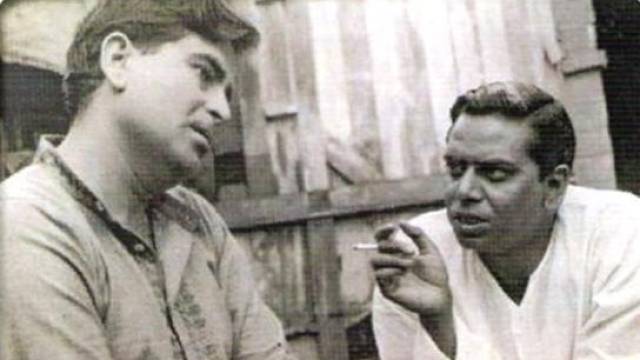
A self effacing man with a deep commitment to egalitarianism who worked as a welding apprentice in Indian Railways, Shailendra would have been just another man in a crowd whose birth and passing do not deserve a mention had he not given vent to his penchant for poetry which Hindi screen legends lipped in songs on screen. As his centenary year passed by this week, one recalls there was no turning back for the man from Mathura whose lyrics enveloped profoundity in simplicity post his journey to the city of gold -Bombay.
“Sajan re jhooth mat bolo; khuda ke paas hai hai, Cahan na hathi hai na ghoda hai; Vahan paidal hi jaana hai…” This song lipped by Raj Kapoor in Shailendra’s maiden production venture Teesri Kasam is a summary of the peerless philosophy of life of the author of these lines.
Many more songs like this set to tune with Shailendra’s lyrics continues to be hummed to this day. They were the words for all occasions be it joy or sorrow, desolation or jubilation. Small wonder, they were hit songs which are much in demand even now among the young and old. For they often bask in the limelight in soirees and of course musical shows on the small screen removing the sepia tint which otherwise would have wrapped them.
Soulful words of Shailendra fitted the tunes of Shankar Jaikishan, Sachin Dev Burman, Naushad and Salil Chowdhury to a tee. It was usually the inimitable voice of Mukesh or Lata Mangeshkar which Raj Kapoor, Dilip Kumar, Rajesh Khanna not to forget Vyjjayantimala and Padmini lipped on the silver screen.
Simple, soulful and profound, these songs had something in common. They were all hits. Shailendra was not quite comfortable with his surname. It was a pointer to his caste which did not quite place him and his own high on social pecking order.
But the numbers flowing out of his pen being hits ensured Shailendra’s way to any high table in Bombay and beyond. After all, call it by any name, in the city of dreams beside the Arabian Sea, success or the lack of it is the final arbiter of being around.
Shailendra was to be made aware of this harsh reality. Accustomed to be feted for the success of the films whose songs he had penned, the lack of box office acceptance of a film he was closely associated with, hastened his passing.
Be it Barsaat (1949), Awara (1951), Shree 420 (1955), Jis Desh Mein Ganga Behti Hai. (1960), Yahoodi (1958), Parakh (1960), Guide (1965), Jewel Thief (1967) and Anand (1971) to name a few, were all running commercial success having songs penned by Shailendra. But the man who left Rawalpindi to make his home in a truncated India could not reconcile himself with box office failure of Teesri Kasam, the only film he had produced.
Shailendra took to the bottle and journeyed to the land of the shadows soon thereafter. It is a pity that soon after he breathed his last, Teesri Kasam directed by his old friend Basu Bhattacharya won a national award and was hailed as a masterpiece in celluloid.
Armed with his belief in social justice, Shailendra joined Indian People’s Theatre Association (IPTA) and continued to nurture his ideology throughout his life. His uncomplicated thought which he put in similar words endeared him to the masses.
It needs to be kept in mind, when Shailendra was penning his songs, creative juices of writers like Sahir Ludhianvi, Majrooh Sultanpuri, Hasrat Jaipuri, Kaifi Azmi and Jan Nissar Akhtar were in full flow. Dubbed Pushkin and Kaviraj by Raj Kapoor who came across him at an IPTA event where Shailendra recited “Jalta Hai Punjab” in the backdrop of the Partition violence, Shailendra was always a favourite of Raj Kapoor.
It is interesting to learn that Shailendra refused Kapoor’s offer to write for the film Aag thinking it would be a watering down of his ideological belief to write for commercial cinema. But pecuniary considerations made him change his mind and he wrote for Kapoor’s film Barsaat (1949) and the rest is history.
Under Kapoor’s baton, Shailendra’s lines set to Shankar-Jaikishan’s subtle tune and Mukesh’s earthy voice made a generation of film goers ask for more. In a career spanning 17 years which included 900 songs, he delved into hope, love, poverty, irony and female emancipation amalgamating Hindi and Urdu with a smattering of folk which had his heart written all over.
The words of the songs he penned spoke of hope, despair, life and longing. The common man felt it was his feelings the songs were speaking of as they were sans any adornment unearthed from the heart of the masses. (IPA Service)
The post Decoding The Work Of The Great Film Lyricist Shailendra Who Mesmerised Common Viewers first appeared on Latest India news, analysis and reports on IPA Newspack.


